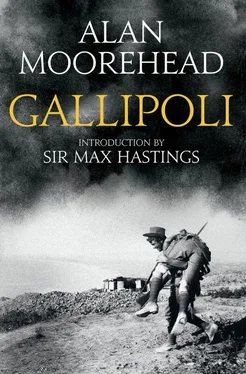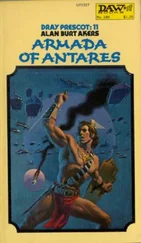To Morgenthau and other Western observers in Turkey who were confronted with the full horror of these events at the time it seemed that what they were witnessing was a reversion of the Turks to their nomadic and barbaric ancestry of the fourteenth and fifteenth centuries. Now at last, after two hundred years of interference in Constantinople, the Russians, the British and the French were out of the way, and the Germans, the only Christian people with any influence left in the country, soon made it clear that they had no intention of interfering. Indeed, it was believed that Wangenheim, or at any rate someone on his staff, had suggested the refinement of adding wholesale deportation to local massacre. The Germans at this moment had a good interest in the Turkification of Turkey, the doctrine of Pan-Turkism; it inflamed the Turks’ military spirit, it made them much more formidable allies in the struggle against Russia and the rest of Europe.
Protests by Morgenthau and even by the Bulgarians had no effect whatever upon the Young Turks. Talaat, who was so often reasonable on other matters, was ferocious on this subject. ‘I have accomplished more towards solving the Armenian problem in three months,’ he said, ‘than Abdul Hamid accomplished in thirty years.’ The Armenians were disloyal, be declared, they had enriched themselves at the expense of the Turks, they had helped the Russians, they were plotting to set up a separate state.
Morgenthau pointed out that Talaat had even turned on his friends among the Armenians.
‘No Armenian,’ Talaat answered, ‘can be our friend after what we have done to them.’
Clearly there was some fundamental thing at work in the Turkish mind, something which was beyond all reason, some terrible instinct that made them feel that they had to persecute somebody in order to establish their own security. The very helplessness of the Armenians seemed to be an incitement. Having once raised their hand, the Turks appear to have felt, with a crazed and guilty logic, that they must go on and on until the very enormity of their cruelty was its own justification. If they could do this thing then they must be in the right. This was the only way to compensate for the unexpressed resentment of so many years.
‘The Turk,’ Aubrey Herbert wrote, ‘was unbusinesslike, placid, and lazy or easy-going. But when he turned in his rage he poured out death in a bucket, and guilty and innocent suffered in his blind anger.’
Before March there were about two million Armenians in Turkey, and it was the Young Turks’ intention to exterminate or deport them all. This task, however, was never completed; barely three-quarters of a million were dead or dying by the time the frantic rage of their tormentors had exhausted itself.
It would be absurd, of course, to argue that the Allies’ failure in the Dardanelles was the only cause of the Armenian massacre; the root instinct of the Turks to destroy this unprotected minority was always there. But March 18 offered them the opportunity, the massacre followed the victory, and the psychological effect on the Turks was immense. From this time onwards the soldiers felt that they were utterly committed; the traitors at home had been stamped out and now they were Moslems together in a common cause. There was no longer any question of surrender or defeat. It was the defiance of the wounded wolf. He had wreaked his vengeance on the weak and now he stood at bay against the world.
Thus before ever the land battle had begun there were decisive influences at work on the Gallipoli campaign, and perhaps in the long run they counted for more than armaments and strategy; March 18 had brought the Turks together, and the auto-da-fé of the Armenian massacres had added a certain desperation, the desperation which presumably the outlaw feels. And it was one more complication in this strange mental web that while the Turks were now quite determined to resist the coming invasion they did not really hate the British and the French — not at any rate in the intimate personal way in which they hated the Armenians and perhaps the Russians. It was opposition of a more dangerous kind. For the Turks the Allies were, quite simply, invaders from outer space, and they prepared to meet them as one prepares to face some tremendous natural upheaval like an earthquake or a hurricane at sea. In other words, they got ready to fight not with passion but simply to survive; they were Turks fighting for Turkey, Moslems against the infidel. The battle, as they saw it, was a straight clash of opposites, a trial of strength and skill which could only end in their own extermination or in victory. Such opponents are probably the most formidable of all — and especially so in this case because these things were not really understood in the Allied camp at the time.
The Turks were seriously underrated by the Allies. They had only been known in retreat and in battles outside their own country. They were expected to fight as they fought the Armenians, recklessly and viciously but not as disciplined soldiers who knew the science of modern war. It was even hoped in the War Office in London that once the Allied expeditionary forces were ashore at Gallipoli the enemy would turn tail and make for Constantinople. There might be moments of difficult guerrilla fighting, but it remained in effect for the British and the French a minor operation.
These were very serious delusions, for the Turks in fact were making the most sensible arrangements for the defence of their country. Directly the bombardment of March 18 was over Enver sent a message to Liman von Sanders saying he wanted to see him in his office. Arriving soon afterwards, he offered the Field Marshal the command of the forces at the Dardanelles.
It must have caused Enver some little heartburning to reach this decision, for his relations with Liman had been getting steadily worse from the moment when, three months before, the German general had derided his plans for the invasion of the Caucasus. To Enver, no doubt, this foreign technician was a solemn bore. In his capacity of Inspector-General of the Turkish Forces Liman had been a persistent nuisance; one day it was a complaint about the hospitals (they were in an appalling state, with spotted typhus spreading everywhere), and the next it was a demand for better food for the men, for rifles, for blankets, for uniforms. Enver at least had been able to settle the matter of the uniforms. Just a few soldiers in Constantinople were presentably equipped, and as soon as it was learned that Liman was about to make an inspection this squad was hurried to the spot with freshly polished boots and shining buttons. But Liman soon found out about this and complained again.
The real argument between the two men, however, had arisen over the disposal of the forces in the south. Enver, as commander-in-chief, had drawn a line through the Dardanelles and the Sea of Marmara, and had set up a command on either side, one in Asia, the other in Europe. This arrangement might have been sound enough at the time when Xerxes crossed from east to west in his advance on Europe, but to Liman’s mind it was precisely calculated to lead to the complete annihilation of the army as soon as an enemy attacked from the south. In short, the defences were placed exactly the wrong way round; the line should have been drawn east and west through the Sea of Marmara and all the forces to the south of it should have been prepared, under one command, to meet an invasion from the Mediterranean. When Liman advanced this view, Enver had replied calmly that he was wrong and the dispositions were going to stay as they were. By the end of February things had drifted towards an open breach, and Enver had even been intriguing for Liman’s recall to Germany.
But now in March when a renewal of the Allied attack on the Dardanelles was expected any minute, it was another matter. Something had to be done quickly about the fortification of Gallipoli.
Читать дальше












